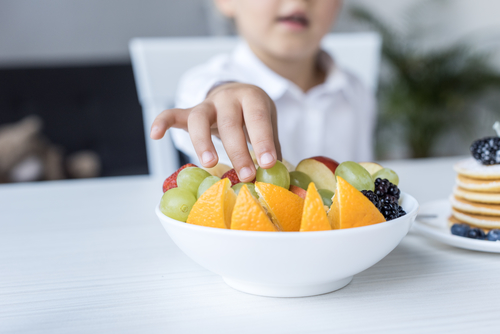Have you ever heard of the Clean Plate Club? Anyone born in the '70s or later likely had parents that used this tactic to get them to eat their vegetables. However, the roots of the Clean Plate Club go much deeper than a simple parenting technique. Here's why you shouldn't force your kids to clean their plate.
The History of the Clean Plate Club
The Clean Plate Club was actually a campaign enacted by the U.S. Food Administration. The “club” was created in 1917 and highly instituted in schools across the country, especially with elementary-age students. It was reintroduced during the Great Depression and again during World War II because of food scarcity.
The goal of the Clean Plate Club was to encourage children to eat less food each day by skipping snacks and eating everything on their plates at each meal. The goal was to reduce the number of essential ingredients that each family would need.
The generation that grew up with the most influence from the Clean Plate Club is the Baby Boomers (those born between 1946 and 1964.) Many Baby Boomers would grow up and also use this as a reference for raising their own children.
Problems with the Clean Plate Club
The Clean Plate Club certainly made an impact on our society and served its purpose during times of food scarcity. But the Clean Plate Club has not been a good thing for our modern era of abundant food sources. In fact, the Clean Plate Club has been quite detrimental to our nation's health.
Problem #1 – Portion Sizes
Other than the Clean Plate Club, many families in the 1950's ate mostly home-cooked meals and had very modest portion sizes. This paints a very different picture than our modern diets which consist of many more packaged foods and fast foods, not to mention our enormous portion sizes.
The average portion size today is up to four times what it was in the 1950s. It's not hard to see why this would cause a problem for people who have been programmed to “clean their plate” at every meal.
Because of this, it is no longer advisable to teach children to clean their plates, as it's not projected that we'll have any food scarcity problems in the near future.

Problem #2 – Food Waste
Many parents think that by making their children “clean their plates” they are wasting less food. However, it does us no good if that extra food “waste” is loaded onto our bodies in the form of extra body weight.
It is possible to reduce food waste without making the waste a part of your body!
How to Waste Less Food Without a Clean Plate Club:
- Save leftovers and reuse
- Serve smaller portion sizes
- Eat more nourishing foods (which help you feel “full” on less food)
Problem #3 – Self Regulation
Those who have been taught to “clean their plates” struggle to know when their body is full, despite the amount of food on their plates. The Clean Plate Club undermines a child's natural ability to know when they are hungry or full, and therefore self-regulate their food intake.
In a society of huge portion sizes, the last thing that we want to do is teach our children to ignore their body's signals that they are full.
I follow this principle when it comes to feeding my children: Don't force children to eat when they are not hungry, feed them when they are.
How to Get Kids to Eat
The biggest question many parents are left with is: how do I get my kids to eat healthy without forcing them to clean their plates?
Probably the biggest shift in attitudes needs to come from parents, not kids. We've got to learn to let go of the power struggles. I have one motto when it comes to getting kids to eat healthy: Offer, don't force.
People automatically assume that because we don't force our kids to eat everything on their plates I must be constantly playing the role of the short-order cook. I can assure you, that's not true.
Getting Kids to Eat Without Forcing Them:
- At every meal, offer your child at least one thing that you know your child will eat. On the side, including a few other healthy choices. Tell them that they don't have to eat everything on their plate, but that you'd like them to try.
- Once your family sits down to dinner, don't make any special trips to the kitchen. The child can choose to eat what is on their plate or go without until the next meal or snack time.
That's it! It's that simple.
At first, you may have a lot of “hit or miss” episodes at meals. You may have a child begging for food between meals.
Just explain the new “rules” ahead of time and stand firm. Your child will need some time to get over the idea that they are adversaries with you over the food issue. If you stick it out, I think you'll be surprised at the results.
I do make exceptions for babies and young toddlers. I believe it's important for them to be fed when they are hungry. For them, I do more frequent “meals”. The younger the child, the more important it is to honor their hunger cues.
How do you handle meals at your house?




